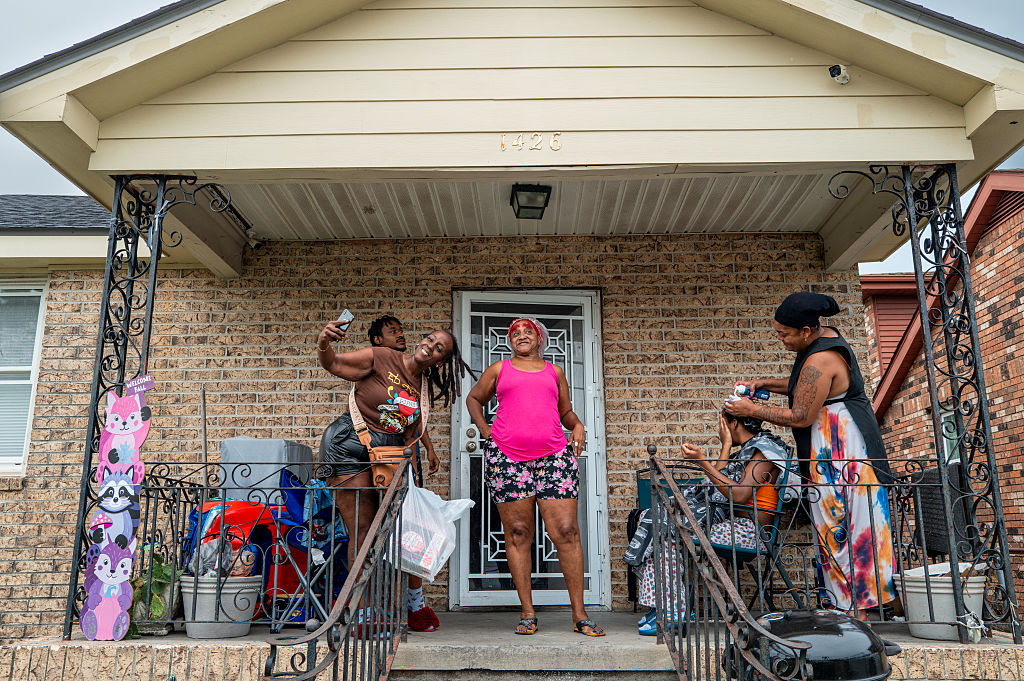[Op-Ed] The Hurricane Katrina Kids We Don’t Talk About

I was in my first week of sophomore year at Spelman College on August 29, 2005. Freshman year was transformative; I was learning about love from bell hooks, living in a new city, and beginning to see how differently Blackness could be experienced and embodied. I was becoming a new version of myself and believed I would not return home to New Orleans after college. That changed after Katrina.
Instead of leaving the city when Hurricane Katrina hit, my family stayed behind at a hotel off Canal Street. My mama and daddy anchored my sister, her partner, my nephew, two uncles, my surrogate grandmother, and my high school boyfriend as they all bore the worst of Katrina together. After a long evacuation that included sleeping in an abandoned school bus in rural Mississippi, they made it to my 800 sq ft. Atlanta apartment, where they stayed for weeks. They’d each lived to tell stories as beautiful and hilarious as they are infuriating and heartbreaking, and to this day, not one can be shared without tears.
Overnight, Katrina had redefined and rerouted my path, sending me in search of my roots. I returned home postgrad for law school at Loyola University New Orleans, where fierce professors like Andrea Armstrong and Majeeda Snead nurtured my thinking and shaped my role as a lawyer. Such a privileged experience learning from women helping to free people from prison would never have happened without Katrina. And from that late August nightmare came my new dream of justice.
Twenty years later, now a mama and the Executive Director of Louisiana Center for Children’s Rights (LCCR), I am reflecting on the children who survived Katrina. Particularly, the children who were locked up when the storm hit, children whose voices were ignored and whose stories went untold.
In 2006, the Juvenile Justice Project of Louisiana, one of LCCR’s parent organizations, reported that 150 children were detained in and around New Orleans as Katrina approached. By the time the storm landed, the parish system had moved every child detained in Orleans and St. Bernard Parishes to the adult parish prison—98% of them Black. Those young people revealed they went three to five days without food, and were so thirsty they drank floodwaters contaminated with raw sewage. In the sweltering heat, some kids stripped naked. When officials finally evacuated them, deputies used violence and threats to “maintain order.”
A 17-year-old boy known as T.J. recalled guards telling them, “You’re not juveniles no more. You are in an adult jail. If you move the wrong way, we’re gonna shoot you.” Another child, just 15, said guards pointed guns at their heads. These children were handcuffed and shackled in groups of 10, enduring extreme hunger, confusion, heat exhaustion, and terror. Hurricane Katrina forced them into adulthood in the middle of what was, at the time, the worst natural disaster in U.S. history. As I reflect, I wonder what’s become of those children.
Two decades later, Louisiana still refuses to treat kids like kids. In 2024, our governor opened a special legislative session on crime, declaring, “These juveniles are not innocent children any longer; they are hardened criminals.” [lailluminator.com] That same year, Louisiana became the first state to roll back Raise The Age legislation and once again treat 17-year-old children as adults in the legal system. One state legislator even claimed some kids are “already lost when they’re 2 years old.”
Now, despite drops in youth crime and on the heels of Hurricane Katrina’s 20th anniversary, Trump has asserted control in Washington, D.C. and encouraged law enforcement to “knock the hell” out of young people “because it is the only language they understand.” I’ve worked with youth for 15 years, and I know our young people to understand the language of care. They can feel that care when we end the criminalization of our children, and pass legislation like the People’s Response Act, which offers tangible opportunities and solutions to help our children by including funding for workforce development, mentorship, and afterschool programs. Here in New Orleans, we need compassionate adults to join It Takes a Village NOLA and pledge to provide the support young people need as we work to dismantle the systems that harm us.
This moment finds us at the intersection of interconnected climate, political, and global crises. As we reflect and remap our future, we must remember our children, if nothing else. We have seen what happens when they are forgotten—like the 150 kids we left to face the flood alone 20 years ago—ignoring them has horrible consequences.
James Baldwin once reminded us, “The children are always ours, every single one of them, all over the globe; and I am beginning to suspect that whoever is incapable of recognizing this may be incapable of morality.”
Hurricane Katrina redefined and rerouted my path, and I found much more than my roots; I found my why. On this anniversary, let us remember that the children are ours, even those locked behind prison walls. Join me in committing to building a world worthy of every single one of them.
Kristen Rome is a youth defender and Executive Director of the Louisiana Center for Children’s Rights. In addition to her legal work, she is a birth doula and mother to a 7-year-old daughter.



